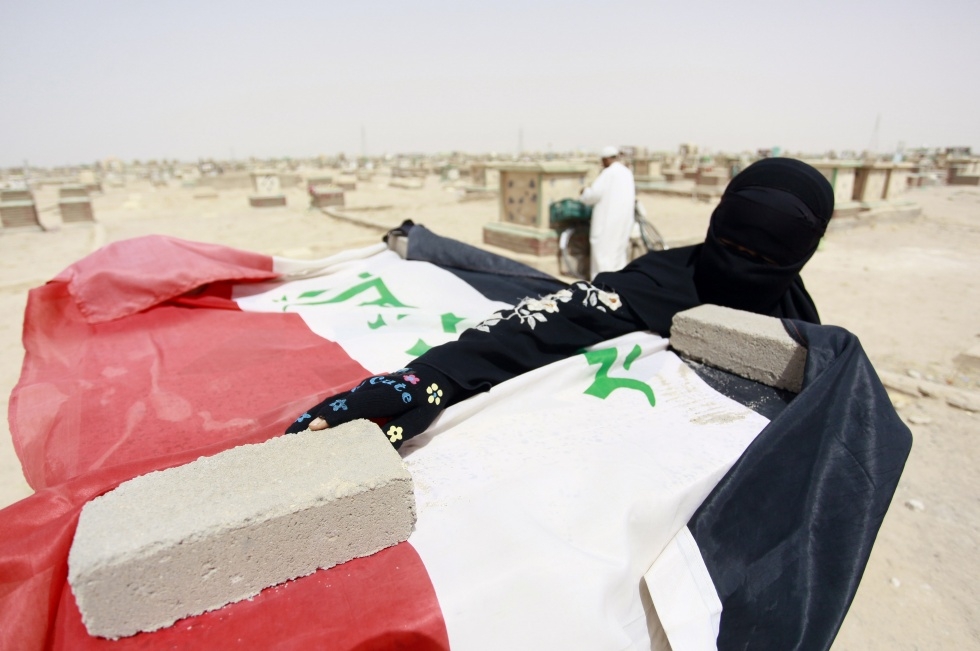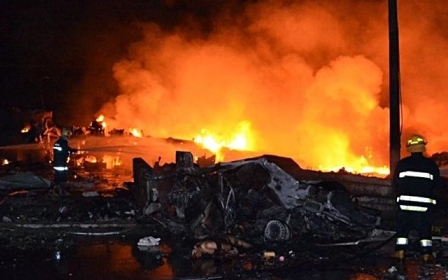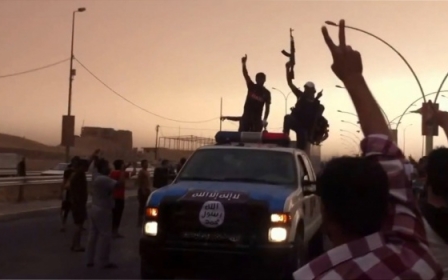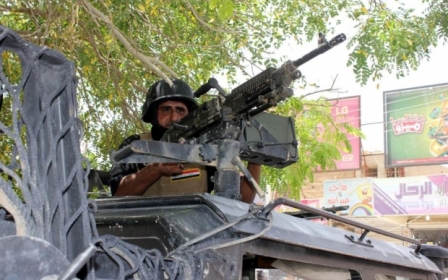No rest for Iraq cemetery as youth join sectarian fight

By Mohammed Abbas
NAJAF, Iraq - Early in the morning in Iraq's holy Shiite city of Najaf, the liveliest place is its cemetery, one of the world's biggest.
Sad convoys of families accompany the bodies of young men in makeshift coffins strapped to the roof of cars or carried in pick-up trucks, the latest generation to fall victim to Iraq's seemingly never-ending cycle of violence.
This time the bodies are from Jurf al-Sakhr, south of the capital, where security forces had days earlier been battling Sunni Islamist insurgents.
"We only got his body back now. Five days in the sun. Acid had been poured over his face, so we only recognised him from his uniform," says Ammar Karim, 27, cousin of slain federal policeman Amer Kadhem, who was in his mid-twenties.
Federal police are more heavily armed than regular police and are sent to the front line, though the distinction between Iraq's different security forces has become blurred.
A recent fatwa from Grand Ayatollah Ali al-Sistani, Iraq's top Shiite cleric, rallied Iraq's Shiites against a sweeping insurgency that began in the northern city of Mosul last month, triggering the mobilisation of thousands of often poorly-trained and ill-equipped young volunteers.
"We get all kinds of bodies. Burned bodies, just a head in a box or bag containing two kilos of flesh," says Sayed al-Yasseri, 47, head of a busy Najaf mortuary inside the cemetery, which has expanded its operations to cope with the influx.
"After Mosul we're seeing far more people born in the 90s, most of them from the (mostly Shiite) south," he adds, speaking in his office against a backdrop of stacks of white funeral shrouds.
'We're washing our brothers'
Blankets used to wrap the bodies on their way to the mortuary are stacked high in the courtyard.
In an austere tiled room, the dead are washed according to Islamic custom on a raised black slab next to a trough of water.
Detergent stored in old mineral water bottles is used to clean most cadavers, but for badly decayed or burned bodies, earth from a bag on a wall is used to ritually purify the remains.
"We're not just washing anyone, we're washing our brothers, fellow Iraqis. It pains me," said mortuary worker Hussein Jabbor, 29, who works 24 hour shifts with five other colleagues.
"We've seen more viciousness. People are coming back burned. They're piling bodies together and burning them, so you don't know who's who."
Adding to some families' grief are phonecalls and texts from people who killed their son, brother or father.
Karim said insurgents had used his dead cousin's mobile phone to contact the family, warning them that they were coming and Iraq's Shiite Prime Minister Nuri al-Maliki would fall.
The family of another policeman killed at Jurf al-Sakhr, Ahmed Dhiaa, who was in his early twenties, had received a call using the phone of a dead colleague, challenging them to collect the bodies "if you are men".
Standing at the graveside, red-eyed and tearful Ahmed Hussein, 38, Dhiaa's neighbour, tells how he had received phonecalls from Dhiaa, whose back had been broken in the fighting before he died. He was later found shot dead, with acid poured over his face.
Valley of Peace
One grief-stricken young man is carried by the armpits away from the gravesite to a waiting car. Another is slumped against the vehicle with his head in his hands.
Graves stretch away into the horizon, many adorned with garlands of plastic flowers and photos of young men mottled by the sun.
Some clutch weapons, fresh-faced in their military fatigues, others in shiny shirts as if at a wedding. One is wearing a graduation gown.
After being washed, bodies are carried in a coffin on the shoulders of relatives and friends around the nearby Imam Ali shrine, one of the holiest in Shiite Islam.
As sombre religious texts are read over loudspeakers, the body is carried around the shrine's golden dome, past its fabulous mirrored vaults and intricately tiled walls, before being interred in the cemetery, known as the Wadi al-Salam, or Valley of Peace.
Graves are initially simple affairs, and are made more elaborate later.
Barely visible among the tombstones is Dhiaa's, marked by an Iraqi flag held in place with bricks, and a bouquet of plastic flowers.
Stay informed with MEE's newsletters
Sign up to get the latest alerts, insights and analysis, starting with Turkey Unpacked
Middle East Eye delivers independent and unrivalled coverage and analysis of the Middle East, North Africa and beyond. To learn more about republishing this content and the associated fees, please fill out this form. More about MEE can be found here.




